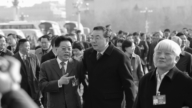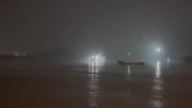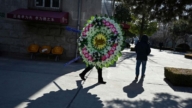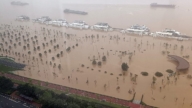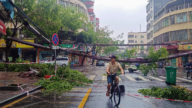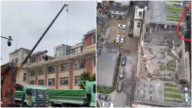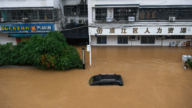【新唐人2013年11月08日訊】最近,發生在天安門和山西的爆炸案,引起了中國社會的廣泛關注。外界認為,中國民眾對中共當局完全失去信心,抗議中共暴政的舉動,從個人的肢體衝突轉向衝擊黨政首腦機關,從個人洩憤上升到政治宣示,從刑事案件上升到政治抗議。專家指出,這種抗暴趨勢還會繼續升級, 不會因為三中全會結束而終止。
天安門撞車爆炸案餘音未了,11月6號,中共山西省委附近又發生系列連環爆炸,爆炸現場散落地上的滾珠和釘子,被認定是自製炸彈爆炸。
據了解,嫌犯大約是在早晨7點左右將炸彈安放完畢,乘坐一輛黑色桑塔納離去。炸彈藏於省委大樓前面的綠化帶的花叢中,共有9枚炸彈,其中8枚炸彈被引爆。
美國紐約民主大學校長唐柏橋:「中國民眾實際上是非常溫和的,原來上訪啊,後面和平示威啊, 然後升級到有意識的了武裝反抗,這是目前的趨勢,而且今後這種趨勢越來越嚴重,當局還不醒悟的話,這場革命將是暴風驟雨式的,可能會有很多流血。」
時事評論員林子旭:「這麼多年來善良的中國民眾一直對中共政府抱有幻想,但是殘酷的現實讓很多中國人徹底陷入了絕望。北京爆炸聲響起來,那種衝擊波會震撼所有被中共壓迫的民眾,山西省委的爆炸事件,很有可能就是有人在模仿北京爆炸案的做法。」
中國近年來在公共場所發生的爆炸、縱火、襲擊等事件接連不斷。據統計,自2008年北京青年楊佳襲擊上海公安局,造成警方傷亡後,五年來,針對官方的暴力報復事件發生了近百宗。
2011年5月26號上午,江西省撫州市市內的三處政府辦公地,幾乎同時遭到炸彈爆炸襲擊。
今年6月,一名男子縱火燒燬廈門一輛公交車,導致包括本人在內47人死亡。 7月,因司法不公造成殘疾的山東籍男子冀中星,坐輪椅在北京首都機場引爆炸藥。
一週前,一輛吉普車衝撞北京天安門,同時製造爆炸事件。
而在天安門爆炸案,和機場爆炸案中,引爆的人,都呼喊大家閃開。
唐柏橋:「所以這些事情都有一個共同的特點,他們並不想傷害無辜,而且他們的矛頭是直接指向當局的,所以我覺得這是變相的革命,或者叫一個人的革命,或者叫一個人的起義,只要中共政權現在的鎮壓政策不變,這種勢頭會越來越猛。」
山西爆炸案發生後,中共宣傳部要求各媒體低調報導,第二天,山西太原出版的各個報紙頭版一片「和諧」,沒有提到山西太原爆炸案,而當天《央視》「新聞聯播」也「漏報」此事。
唐柏橋:「中共能夠維持到今天,他們非常狡猾,有時候想給民眾栽贓,像天安門自焚案,它給法輪功潑污水,但現在形勢變了,你怎去批評他,怎麼去攻擊人家,反正老百姓把他當成英雄,所以在這種情況下,就要低調報導。」
山西省委連環爆炸案後,太原汽車總站發出通知說,11月7號起,太原長途汽車站到北京的旅客購票實行實名制。
林子旭:「面對這一切,中共一定會利用更暴力的手段來鎮壓民眾,這樣民眾的反彈也必然會更加強烈,今天的中共危機重重,民眾的抗爭如果再堅決猛烈一些,估計中共就要撐不住了。」
中國「上海大學」研究中國社會意識問題的教授朱學勤認為,這些爆炸、襲擊單個看來是孤立的刑事事件,但把它們放在一起看,會看到一個令當局非常不安的趨勢,事件已經發生了質的轉變,性質從個人洩憤上升到政治宣示,從刑事案件上升到政治抗議。襲擊者自殺還是造成他人傷亡的數字本身反而已經不重要了。
網友提醒大家,社會開始亂了!中共政權已經開啟恐怖模式,政府部門和人群密集地段都是高危區域,到政府部門辦事要戴上頭盔。
採訪編輯/劉惠 後製/鍾元
Tiananmen Square and Shanxi Bombings Reflect New Public Protest Trends
The recent car bomb attack in Tiananmen
Square, and subsequent bombing in Shanxi
have caused widespread concern in China.
International observers believe that the Chinese
people are fully losing confidence in the authorities.
In protests against the regime, there has
been a shift from physical protest and
conflict, to targeting of government buildings.
There is a move away from venting personal
anger, and towards political declarations,
and from criminal cases to political protest.
The experts pointed out that the uprising trend of against the
tyranny will not be end with the Third Plenary Session terminates.
On November 6, a series of explosions took place near
the provincial government building in Shanxi Province.
This was while the shadow of the
Tiananmen bombing still lingered.
Ball-bearings and nails were scattered at
the explosion site from a homemade bomb.
It is reported that the suspect set the bomb at
7am in the morning, and left in a black Santana.
There were bombs hidden in the vegetation in front
of the Provincial Building, and eight were detonated.
Tang Baiqiao, President, New York University
Democracy Academy of China:"The
Chinese people are actually very gentle.
The current trend is shifting from petitioning and
peaceful demonstrations into the armed resistance.
If the authorities do not wake up, there will be a mighty
storm, and bloodshed in increasingly serious revolution."
Lin Zixu, political commentator: “The kind Chinese people
have been living under an illusion with the Chinese regime.
Harsh reality has brought them to complete despair.
The impact from the Beijing explosion
has shocked all oppressed people.
The Shanxi Provincial bombing
resembles a copycat bombing."
There have been more and more explosions, arson and
assaults happening throughout China during recent years.
According to statistics, there are hundreds of violent
uprisings against the regime in the past 5 years.
These occurred after Yang Jia assaulted members
of the Shanghai Public Security Bureau in 2008.
Three government offices were simultaneously
attacked by a bomb in Fuzhou, Jiangxi Province in 2011.
This June, a man set fire to a bus in Xiamen,
resulting in 47 deaths, including himself.
In July, Ji Zhongxing, detonated dynamite
in his wheelchair at Beijing Capital Airport.
A week ago, a jeep crashed in Beijing
in Tiananmen Square, and exploded.
The people who Bombings detonated in Tiananmen Square
and airport all called out to clear.
Tang Baiqiao: “A common feature in these incidents
is the target of attack, which are directed toward
the authorities, and not towards innocent people.
This is a disguised revolution, or personal
revolution, or a form of personal uprising.
This kind of revolution will become increasingly fierce, as
long as the Chinese regime’s repression remains unchanged."
The Propaganda Department directive on the Shanxi
bombing was to only allow low-profile coverage.
The day after the incident, front pages of
all Taiyuan newspapers were “harmonious",
with no report on the Taiyuan bombing report.
China Central Television also failed to report on the bombing.
Tang Baiqiao: “The Chinese authorities are
very cunning, in order to maintain their rule.
It is commonplace for the regime to shift
responsibility towards others that they want to target.
In the Tiananmen Square self-immolation, it
shifted the responsibility onto Falun Gong, where
in fact it was the regime’s propaganda stunt.
Now people regard Falun Gong as the hero,
no matter how the authorities attack them.
In this case, they have to report in low key."
After the Shanxi bombings, staff at the Taiyuan Bus
station noticed that real names needed to be provided
when purchasing a ticket from Taiyuan to Beijing.
Lin Zixu: “In this case, the Chinese regime will use more
violent means to suppress, with more strong rebounds.
If public protests are more resolute and violent, the Chinese
authorities will not be able to hold the system together."
Professor Zhu Xueqin from Shanghai University comments
that these explosions, and attacks appear to be isolated.
When we put them all together, they may create
a very disturbing trend for the authorities.
There is a qualitative shift from individuals venting anger to
political declarations; from criminal cases to political protests.
It is not just about the numbers of people hurt in the incidents.
Netizens comment that Chinese society is deteriorating.
The Chinese Communist regime
is now in anti-terrorist mode.
Government departments and
crowded places are high-risk areas.
People need to wear a helmet to
go to the government departments.


